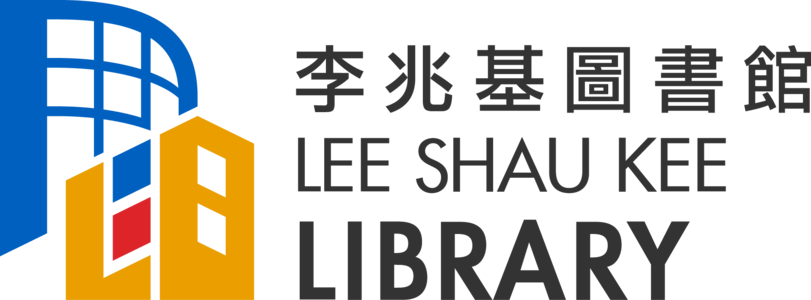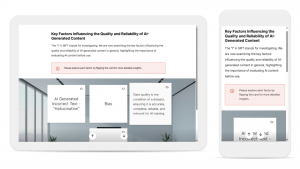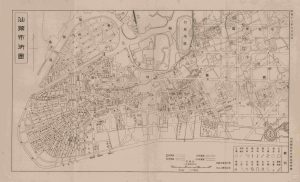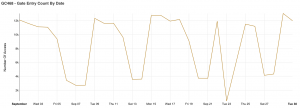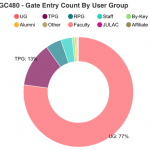
Issue No. 138
November 2025
Improve Your Research With GenAI — Start Here!
 Do you have any of these problems when using AI?
Do you have any of these problems when using AI?
• Which AI tools should I use for my topic – and how do I judge whether they are reliable?
• What are the differences between AI tools and library databases?
• Why does AI hallucinate, and how can I spot mistakes fast?
• How can I write prompts for accurate, relevant results?
• What’s the right way to cite or disclose AI use in assignments or publications?
• Is my data safe if I paste text into an AI tool?
One practical solution!
The Library’s self-paced mini course, AI Tools for Academic Research. It teaches responsible GenAI use with an information literacy, critical thinking approach. It’s short, focused, mobile friendly, and requires no login. Open it when needed and apply the tips to your current project.
How can this help?
• Build AI literacy for research and learning, not just quick answers.
• Know when to use GenAI and when library databases are the better choice.
• Apply, evaluate, and share AI outputs ethically and transparently.
What’s in the course? 7 bite-sized micro-modules:
• Evaluating GenAI – A Practical Framework
• Assessing Gen AI Capabilities & Limitations
• Evaluate & Select GenAI Tools for Research Tasks
• Writing Effective Prompts (Basic Prompting)
• GenAI Tools for Research Literature Search: the Fundamentals
• Evaluating AI Output Systematically
• Privacy, Copyright, & Citing Issues with GenAI tools
• Pick one micro-module above that matches your immediate task – searching, summarizing, drafting, or checking.
• Learn on your phone in minutes, then plug the technique into your assignment or research.
Co-create with us
• Everyone: your experience shapes what comes next. After a module, leave quick feedback – what helped and what topics you want added.
• Instructors: we can help embed these modules into your Canvas course as an assignment, contact us at lbref@ust.hk.
Start here: https://libguides.hkust.edu.hk/ai-tools-academic-research
Small steps, real progress – whenever you need it.
| Mini-quiz: How many people enter the Library every day? Answer at the end of Historical Maps and Stories of 20th-century China |
|---|
Collection Spotlight: Exciting Upgrade to S&P Capital IQ Pro!
 We are thrilled to announce a major upgrade to our subscription of S&P Capital IQ Pro (CIQ)! This web-based financial platform is now available to all students, faculty, and staff. You can easily sign up for an individual CIQ account using your HKUST email.
We are thrilled to announce a major upgrade to our subscription of S&P Capital IQ Pro (CIQ)! This web-based financial platform is now available to all students, faculty, and staff. You can easily sign up for an individual CIQ account using your HKUST email.
Previously, only faculty and research postgraduate students could have personal accounts, while others using dedicated CIQ terminals in the Library. With this new campus-wide access, everyone can explore CIQ anytime, anywhere for private and public company data, industry insights, private markets, and macroeconomic information, along with news and research.
CIQ offers powerful tools, including an Excel plug-in, for in-depth financial research and analysis. Whether you are doing market research, analyzing investment opportunities, or seeking insights into economic trends, CIQ can help.
We encourage everyone to take advantage of this exciting opportunity and explore the wealth of information through CIQ. Sign up today!
For details on how to register for a CIQ account, visit https://lbdiscover.hkust.edu.hk/bib/991013224259003412.
E-Identity Now in Full Operation at All Library Entrances
Following a successful trial earlier this year, we completed the installation of ITSO’s Smart Door access panels at all entry gates on G/F, LG1, and LG5. This major upgrade marks an important milestone in enhancing both security and user convenience through the HKUST electronic identity system.
The new e-identity system utilizes dynamic QR code technology, accessible through the HKUST QR Code mobile app for students and staff. More information on setting this up is at https://itso.hkust.edu.hk/services/general-it-services/e-identity.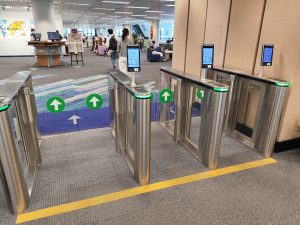
With the new panels, Library users can enter using either their physical HKUST card or a dynamic QR code generated in the HKUST Mobile App. We encourage you to explore both access options.
The system also supports seamless visitor access using one-time QR codes. The e-identity system offers a secure and flexible way to enter the Library, ensuring uninterrupted access even if you forget your physical card.
For inquiries or suggestions about this new system, please contact lbsystem@ust.hk.
For immediate assistance with entry, please use the doorbell button to contact the Service Counter.
Updated Guidance on University Records Retention and Disposal
The University Archives has recently released an updated “Guidance on University Records Retention and Disposal,” now available for all HKUST staff! Having incorporated comments from offices and reflected the expanded scope of the University’s operations, the revised guideline serves as a handy reference to help you manage records more effectively and efficiently – After all, records are essential assets to the University!
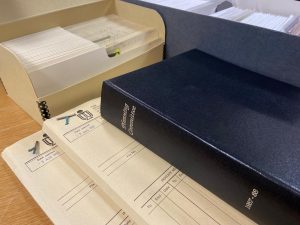 Why does records scheduling matter?
Why does records scheduling matter?
Whether your office is responsible for managing student records, overseeing a research project, or handling administrative tasks, proper records management is crucial not just for compliance with legal and regulatory requirements, but for ensuring that vital information is organized and accessible as long as it is needed; and that unnecessary records are not kept longer than required, reducing risks and freeing up valuable storage space.
How to use the Guidance?
The Guidance is structured in two parts, first offering insights into key concepts and records scheduling rationale before setting out the full records retention and disposal schedules. Navigate to the relevant subject group for recommendations on how long to keep different types of records – both physical and digital, and how they should be eventually disposed of.
While the Guidance is not mandatory, we encourage offices and departments to develop their own tailored retention and disposal schedules based on these recommended schedules and their own specific operational contexts.
 Preserving our University’s history
Preserving our University’s history
By using this Guidance, you’re also playing an important role in identifying records and materials of historical significance that may deserve a place in the University Archives. Your support will greatly assist us in preserving HKUST’s corporate memories for future generations.
Read more about the Guidance at https://library.hkust.edu.hk/collections-resources/archives/retention/.
If you have questions about managing your records or have come across old records that might be historically significant, reach out to us at lbarsc@ust.hk.
Historical Maps and Stories of 20th-century China
We are excited to introduce three historical maps from our “Maps of China, Late Qing Dynasty-1949” collection: Map of Guangdong Province, City Map of Guangzhou, and City Map of Shantou.
These maps were created in 1938 by the Government-General of Taiwan, which was under Japanese rule at the time. Likely intended as key intelligence vehicles for Japanese military operations during the Sino-Japanese War, they present meticulous details of the cities, particularly on transportation and infrastructure networks. Multiple legends on the maps highlight features such as railways, bridges, piers, and even roads of various widths, including 40/50-foot roads, 60-foot roads, 80-foot roads, and 100-foot roads! All these details provided useful information for military logistical planning.
Now, as historical artefacts, these maps give valuable historical geographic information of the Guangdong region during the early 20th century. The city map of Shantou, in particular, offers a fascinating glimpse into this bustling treaty port city in the 1930s.
Several prominent landmarks are easily recognizable, including the Swire Warehouse, the Swire Pier, the China Merchants Group’s warehouse and pier, the Japanese Primary School, as well as the American and French Consulates. From this old map, you can get the vibe of Shantou – a wide variety of activities were ongoing in this vibrant trading hub.
To explore our map collections, visit the Rare & Special e-Zone at https://lbezone.hkust.edu.hk/rse/.
Thanks to a generous donation from Dr. Ko Pui Shuen, we are launching digital initiatives that will transform these historical maps into engaging digital stories. In collaboration with Prof. David Chang from the Division of Humanities, our team is using the map of Guangdong Province and the city map of Guangzhou to visualize the historic event of the Japanese Surrender in Guangzhou in 1945. After years of resistance, the Nationalist Chinese army returned to the city, marching and parading before its residents – a moment that will be vividly depicted on our digital map. Please stay tuned!
| Mini-quiz answer: 12,000-14,000 people enter the Library daily! |
|---|
Dual Displays at the KPS Gallery
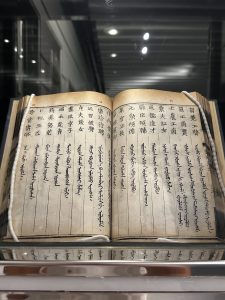 The KPS Gallery is hosting two displays telling different stories: books from the Qing Dynasty (1644–1912) from our Special Collections, and a special re-run of the popular “The Story of HKUST’s Birth” exhibition from the University Archives.
The KPS Gallery is hosting two displays telling different stories: books from the Qing Dynasty (1644–1912) from our Special Collections, and a special re-run of the popular “The Story of HKUST’s Birth” exhibition from the University Archives.
As the last dynasty in Chinese history, the Qing stands out for its unique characteristics, most notably, its ruling class, the Manchu, who were an ethnic minority originating from northeastern China. This distinction influenced many aspects of Qing governance and culture.
The display features bilingual works in classical Chinese and Manchu, including Manchu-Chinese dictionaries, Manchu translations of Confucian classics, and Chinese moral teaching primers translated into Manchu. One of the highlights is Manchu translations of The Four Books (繙譯四書), Chinese classics embodying the core values and principles of Confucianism, which were an essential part of the curriculum for the civil service examinations during the Ming and Qing dynasties.
The returning exhibition, “The Story of HKUST’s Birth” is back! This time, in addition to valuable historical documents, photographs, ephemera, and artifacts that illustrate the planning, construction, inauguration, and opening of HKUST, you will also discover how the University welcomed the very first cohort of students and exciting moments from the University’s first Open Day.
Leisure Reading Zone
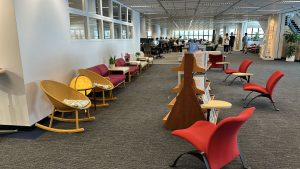 One of the areas we tried to improve for you this summer is the space around the Popular Books collection on G/F. We added and rearranged furniture to make this a more inviting place for leisure reading and exploration, rather than just some walkways and book cases.
One of the areas we tried to improve for you this summer is the space around the Popular Books collection on G/F. We added and rearranged furniture to make this a more inviting place for leisure reading and exploration, rather than just some walkways and book cases.
The new look includes several different types of casual and soft seating – from rocking chairs to sofas, along with some side tables and a lighted globe. The latter serves both as a nice ‘accent’ to the space, and as a tool for those wanting to locate a place from the book they are perusing.
What’s On at the Library Gallery
Discover the Life and Legacy of Lam Ping Yu
Since August, the Library Gallery has featured an exhibition on the life and legacy of Chinese naval officer Lam Ping Yu. Lost and Found in Hong Kong: The Unsung Chinese Heroes at D-Day traces his early training in Britain, his role in the D-Day landings, and his post-war life in Hong Kong. Through historical artifacts and personal stories, visitors gain a rare glimpse into Lam’s journey.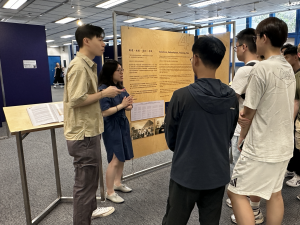
To enrich the experience, our curators have hosted guided tours, sharing behind-the-scenes research and insights. A special highlight was a French-language tour arranged in collaboration with the French Centre for Research on Contemporary China (CEFC), a long-standing campus partner.
With only a few days left, we encourage you to visit and explore this remarkable story.
Coming Soon: Imagining Hong Kong—Four Visions of Island Landscape in Ink and Color
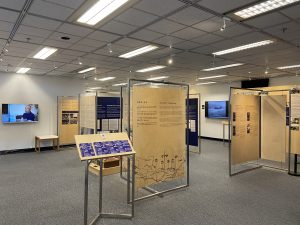 In mid-November, the Gallery will present a new exhibition: Imagining Hong Kong—Four Visions of Island Landscape in Ink and Color. Featuring works by Ross Yau Wing Fung, Sim Shum Kwan Yi, Chan Kwan Lok, and Sam Cheng, the show offers fresh perspectives on Hong Kong’s diverse landscapes, including scenes like the walled Hakka village of Kuk Po.
In mid-November, the Gallery will present a new exhibition: Imagining Hong Kong—Four Visions of Island Landscape in Ink and Color. Featuring works by Ross Yau Wing Fung, Sim Shum Kwan Yi, Chan Kwan Lok, and Sam Cheng, the show offers fresh perspectives on Hong Kong’s diverse landscapes, including scenes like the walled Hakka village of Kuk Po.
To complement the exhibition, we’ll host artist talks and live demonstrations, offering opportunities for direct engagement and deeper appreciation of the creative process.
Whether you’re drawn to Lam Ping Yu’s legacy or the vibrant visions of Hong Kong’s artists, the Library Gallery invites you to explore, reflect, and connect. Stay tuned for updates and event details!
last modified 31 October 2025

